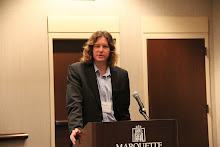I just found out that I will be presenting at the 2010 annual meeting of the Society for Phenomenology and Existential Philosophy. I am both excited and honored, as this will be the second year in a row that I will be presenting a paper at SPEP.
My paper this year is entitled "Pushing the Hegelian Front: On Heidegger’s Renovation of Dilthey". Here is the abstract:
This paper seeks to trace the influence of Wilhelm Dilthey upon Martin Heidegger’s “stand on the front against Hegel” and to make clear the extent to which Heidegger goes beyond Dilthey’s own Hegelianism. In the course of this discussion we will focus upon Heidegger’s adoption of Dilthey’s Hegelian holistic understanding of “life” as a totality irreducible to constitutive parts, Dilthey’s expressivist commitment to the principle of immanence, and the role concrete objectivations play in articulating the structures that constitute life. Finally, we will see to what extent Heidegger’s conception of art goes beyond Dilthey’s limited Hegelianism.
The paper I presented at SPEP in 2009 was entitled "Phenomenology and the Problem of Universals" and has also now been presented as a symposium paper at the central meeting of the American Philosophical Association and at Koc University in Turkey. Here is the current abstract for that paper as well:
This paper is an attempt to argue that Martin Heidegger's Being and Time should not be read as a traditional transcendental project. Rather, what phenomenology is for Heidegger, and what Being and Time attempts to provide us with, is a realist historicism of practices. In order to make this argument I briefly discuss Edmund Husserl's relation to the transcendental tradition and why he believed he could arrive at a-historical knowledge and then express some concerns we, and Heidegger, may be expected to have in relation to Husserl's project. Next I show how several of Heidegger's earliest commitments and methodological insights force him, even before the writing of Being and Time, to reject a transcendental project of either the Kantian or Husserlian type. Finally I suggest several key elements of an anti-transcendental, or at least historicist, reading of Being and Time.
Subscribe to:
Post Comments (Atom)


No comments:
Post a Comment